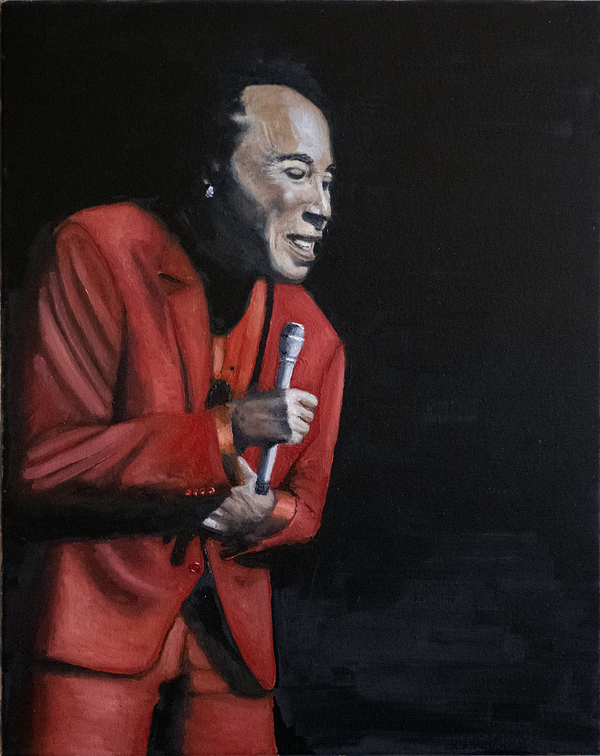The list of recording artists who have released albums after age 80 is a short one, although not that short when you recall pop music itself is roughly nine decades old.
Willie Nelson, Tony Bennett, Leonard Cohen, B.B. King, Mavis Staples, John Cale—it’s quite a club. Smokey Robinson joined last year, releasing his first original album in 15 years, aged 83.
It struck me as personally improbable—I associate Smokey with the end of life.
A child in the early ‘90s, I spent hours in the car accompanying my mother to care for my dying grandmother. In the morning, the oldies station never failed to play a selection from Robinson’s massive Motown catalog. At night, it would be adult contemporary music influenced by Smokey’s 1975 genre-minting album of R&B slow jams, Quiet Storm.
The sight of Smokey’s always ethereal face, now frozen in botox and promoting a new album on TV, brought back those long drives. What I experienced as an education in pop only later was revealed as the soundtrack to something sadder. It makes for a strange juxtaposition with Smokey’s consistent interest in romance, ardor and lust.
Have I mentioned that the new work is a concept album about sex called Gasms? Insert your own joke here about the la petit morte.
“I have a different attitude to it, but I still feel sexual,” he told The Guardian while promoting the album, which made the quote a headline. Gawping at the idea of senior citizens in lust should be passé, but that’s often how Robinson’s return was framed.
The PR campaign included the admission of his long-rumored affair with Diana Ross while married to his first wife, and a justification that suggests he’s ready to enter the polycule—”I learned that we are capable of loving more than one person at the same time, and it has been made taboo by us, by people.” His late-career turn from innuendo to specifics might be the times finally catching up with what he always wanted to say.
Smokey has been selling sex for a long time. Born in 1940, a founding artist at Motown Records in 1959, his Miracles became the label’s first hitmaker. He became an exec, and still calls founder Berry Gordy his best friend, notwithstanding Gordy and the label's elaborate mistreatment of its artists. A songwriter and producer, Robinson would craft a series of defining pop gems—”The Tracks of My Tears”, “Shop Around”, “You’ve Really Got A Hold On Me”, “My Girl”.
The latest album doesn’t compare to his immaculate catalog. Pitchfork, in its poptimistic death throes, gave it a generous 7.2. You can see why—the respect is due, the album is comfort food, what you might imagine ChatGPT would produce if you asked for a Smokey Robinson album—but it doesn’t betray the inspiration of Smokey’s earlier work.
The typical octogenarian album tries to seem progressive. Bennett sang his beloved standards, but with Lady Gaga; Cohen, always dark, dealt explicitly with the topic of death; Nelson covered Frank Sinatra—but that’s not how Gasms comes off. I wish Smokey had found a contemporary producer like Anderson Paak, who recruited the icon to sing a hook on his 2019 album Ventura.
Still, I imagine Smokey didn’t want (or need) anyone telling him what to do. He more or less invented this format. Age has slowed him, but not stopped him yet: Watching him perform an NPR Tiny Desk concert, you can see him grasping the table for dear life—but that perfect falsetto still hits, even without the power of yesteryear.
When Motown got off the ground, US labels were producing some 15,000 or more new songs for the radio each year. Robinson wrote or co-wrote three number one Billboard hits and 15 R&B chart toppers. I doubt he expected that many would become eternal—the soundtrack of my parents’ youth, my own, and now that of my son.
That’s some act of transubstantiation—the ephemerality of pop, young love, and yes, I suppose, the gasm of your choice, turned into unanticipated longevity.
Tim Fernholz is a writer in Oakland, California. He is a senior reporter for Quartz and the author of Rocket Billionaires: Elon Musk, Jeff Bezos and the new Space Race.
Art by Lee Smith
